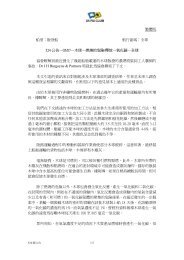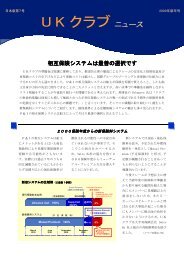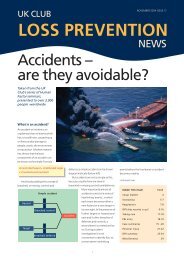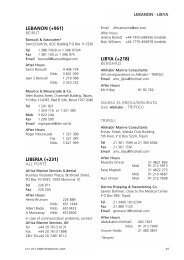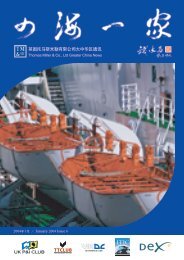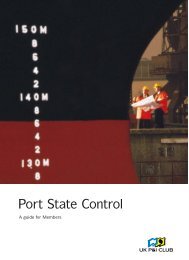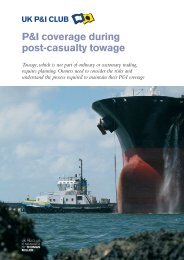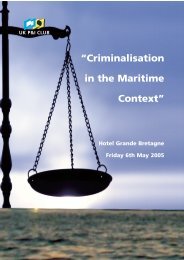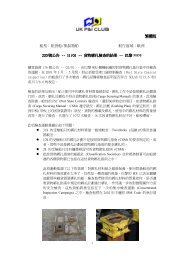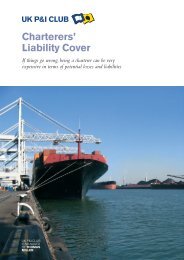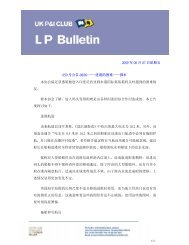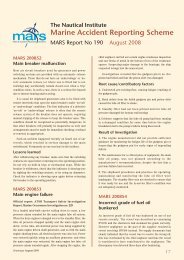Read full text
Read full text
Read full text
- No tags were found...
Create successful ePaper yourself
Turn your PDF publications into a flip-book with our unique Google optimized e-Paper software.
FROM the early years, ‘United Kingdom’ in the title of the club became less and less an accurate descriptionof the membership. As the books of entries pre-1926 were destroyed and 1885 is the first year for a complete runof rule books, in which lists of steamers were appended, it is impossible to give an accurate date for the first nonUK steamer to be entered. Certainly by 1876 the Katherina II, built in St Petersburg in 1874, appeared in the listof 418 vessels, along with two new-builds from Rotterdam. Two ships from Nantes, France were in by 1882. By1885 a Greek ship, Embiricos, was trading in the Black Sea, and among the 970 entries for that year there are shipsfrom Antwerp and Malmo. Constantinople, with the Thiresia, appears in the 1887 list of 860 vessels. By this timethe Low Countries, with 12 entries, were the best represented foreign interests in the club.Early overseas entries were mainly from Northern Europe, coming through geographical proximity and closetrading relationships with Britain. The notable exception was the Greeks from the Eastern Mediterranean.There the influence was cultural and hence deeper, growing in volume after World War I. Greek ships nowaccount for one-quarter of the tonnage entered in the club.Fotis Lykiardopulo, of a third generation in shipping, sketches the cultural background: The Greeks who wentinto shipping firstly knew something about the sea because we are surrounded by the sea but far more important than that,they were adventurous. Everybody was related. The captain was related to most of the crew. People behaved well becausethey were frightened what the head of the family, the captain, would report back in the village. There was a wonderful senseloyalty and discipline. It was hard work and a hard life. It was not common to all Greeks. They went and worked in shipsand got shares with family help. They got their master’s certificate. When they went abroad and opened a small office orworked in an office abroad, the first thing was to bring their families there. It sprang up with no help whatsoever from theGreek government. That has always applied to Greek shipping. We have no help in terms of finance. We have to do all thisourselves. Our own country is too poor to offer it to us or to support us in any way. So individuality is the key work of gettingup, taking risks and discomfort and leaving your family, going to sea to work, going ashore. A lot of them deserted ashorebecause they could not get visas to go there, and started up abroad. When they brought some for their families, some becamedishwashers when they arrived, but always it was this desire to improve oneself. Miles Kulukundis sketches his familyexample: We have been shipowners for some 200 years. They were seafarers because the islands did not support them. Theyhad to look to the sea. Fishing was the first step and then trading. Trading in the Mediterranean was an industry for 2,000years or more. My direct grandfather lived on the Island of Kasos and half of his family was born there. He was a ship’smaster and they moved from Kasos to Thira, which was the coaling station and probably the major port of Greece in about1900. Then in 1919 one of my great-uncles had the view that if you were going to be in the mainstream of the shippingindustry he had to come to London, and set up Rethymnis &. Kulukundis as an agency.Examples could be multiplied into a composite portrait of a Greek shipowner. Be he an owner-master plyingthe Aegean or an expatriate in Monaco or New York overseeing an international tanker fleet, the attitude andpattern of progress are similar. An element in securing that progress is protecting the assets and insuring againstruinous liabilities. Soon after opening in 1921 an office for Rethymnis & Kulukundis in the City of London, thecentre of chartering and insurance, Manuel Kulukundis, uncle of Miles, called on Dawson Miller and offered toput ships in the club. Other firms followed as lower-cost Greek shipping re-established itself in the difficult conditionsof the early 1920s. Currently, the UK Club covers some 40 per cent of the beneficially owned Greek merchantfleet.The circumstances in which nations entered the club varied. Cultural backgrounds, the political stance ofregimes, pressing practical considerations, the meeting and meshing of personalities all played a part.Introducing the P & I concept was not the application of a formula; the approach had to be individual.



